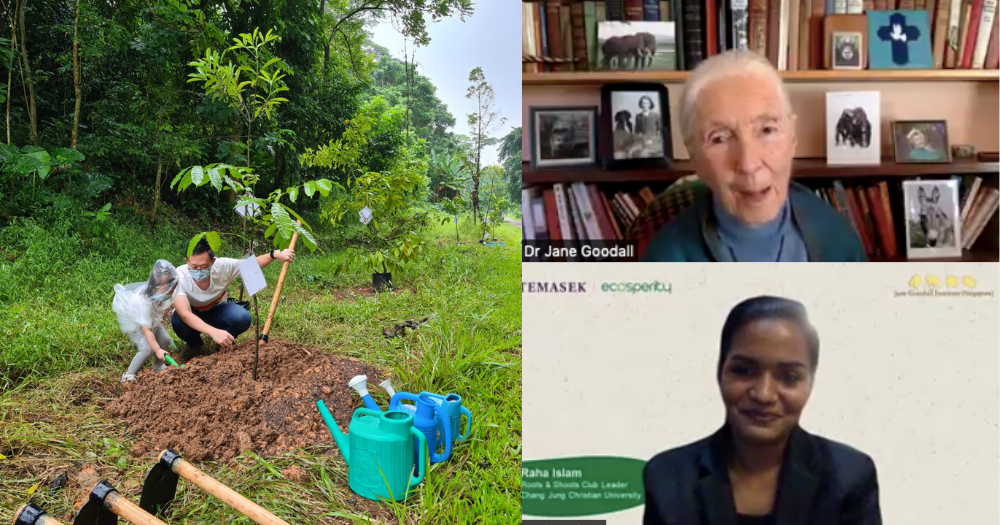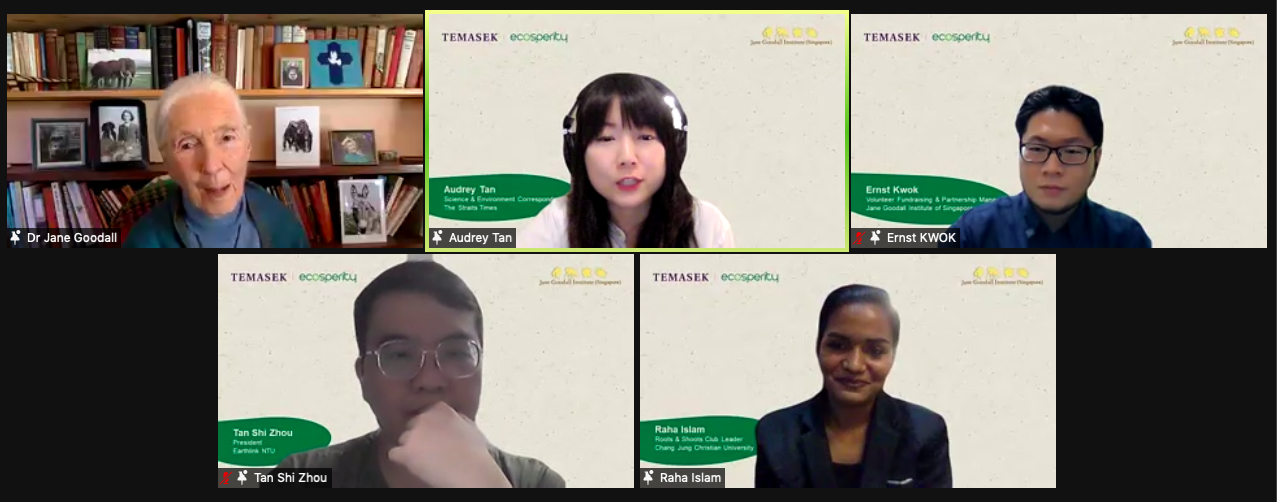Follow us on Telegram for the latest updates: https://t.me/mothershipsg
Renowned primatologist and conservationist Jane Goodall underscored the need for our youths to remain optimistic about the climate crisis, to start small and take action.
She was speaking at the Ecosperity Conversations webinar "Reconnecting with Nature", held as part of Temasek's sustainability event.
The session was moderated by The Straits Times' Science and Environment Correspondent Audrey Tan, and featured three other panellists, all of which were young climate leaders from Asia.
Biodiversity loss is not irreversible
One of the panelists was Raha Islam, a Roots & Shoots Club Leader studying at Chang Jung Christian University in Taiwan.
Addressing the role of young people in calling for change, she said, "The damage that we have done to this world, I don't think it can be reversible, but we can [keep] it from further worsening."
In response, Goodall weighed in:
"I have to say one thing to you, Raha.
And that is you say it is too late to reverse [biodiversity loss], that isn't true.
All around the world, nature is amazingly resilient. Give nature a chance, and places that we've utterly destroyed can become green again and support life and support diversity. [...]
It's not too late. We can’t go back to where it was originally, but we can start reversing things. And we must."
Do not lose hope
In her travels, Goodall recounted that she met many young people who seemed to have lost hope.
"They were angry, they were depressed, or they were just apathetic."
"It dawned on me that if young people lose hope, we've had it," she said.
"We have to take action, and people who lose hope, as many people have, because of the doom and gloom, they fall into apathy and do nothing."
"And if that happens, that's the end of our human species."
Start small, not big
If young people feel that they can do nothing because the problems of the planet are too big, she advised them to "stop thinking as we are repeatedly told - think globally, act globally".
"It's the other way round. If you think globally, you get depressed."
Instead, she encouraged young people to act in small ways to influence others around them.
"If you first of all think 'What can I do locally?', and you take action with your friends, and you find that you are making a difference."
"Then that gives you more hope, and more hope makes you take more action."
Reconnecting with nature
On the topic of reconnecting with nature, Goodall stressed that "we have to make a new relationship with the natural world".
"How is it that we have gotten into this mess — this pandemic, this climate change, this loss of biodiversity?"
"It is because of our absolute disrespect for the natural world and animals."
Goodall pointed out that people nowadays spend more time online, and less time outdoors.
This modern lifestyle affects how people appreciate nature.
"We cannot love and respect something we don’t know," she added.
A tapestry of life
Goodall also said that we heavily depend on natural world for clean air, clean water and food.
"I see it as a great, beautiful tapestry of life," Goodall said, referring to the complex interrelationships between the plants and animals in the ecosystem.
"And every time our actions causes a species to become extinct, it is as though we pull a thread from that tapestry."
"If enough threads are pulled, the tapestry will hang in tatters, and the ecosystem will collapse," she said.
"That's why biodiversity loss is equally as important as climate change."
In the webinar, she encouraged parents to support their children in the things they are interested in.
"It is the will that we need. It's you, young people, who demonstrate that you have the will, so we can, and we will, and we must, make this a better world for the future."
Follow and listen to our podcast here
Top images by NParks/FB and screenshots from Ecosperity.
If you like what you read, follow us on Facebook, Instagram, Twitter and Telegram to get the latest updates.

